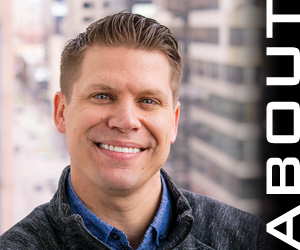Firm Journey | Spring 2020
How ‘OK, Boomer’ Is Holding You Back
Young accounting and finance professionals can overcome bias, project professional expertise and, ultimately, earn respect—if they lose the ‘OK, Boomer’ mindset.

Tim Jipping, CPA, CGMA
Owner, Journey Advisors & CPAs
Navigating the Accounting and Consulting Landscape
Recently, I was meeting with a prospective new client to discuss her tax situation.
Throughout the meeting I could feel her glare as she sized me up. Finally, near the end of
our conversation she asked the question she’d been holding back for 30 minutes: “Just
how long have you been doing this sort of work?” It was a polite way of asking, “Exactly
how old are you, my dear?”
Frankly, this wasn’t the first time I got this question. In fact, I’d say for everyone I work with
above the age of 50, experience (ahem, age) is a large concern. Sometimes it takes all my
self-control to avoid snapping back with a snide remark like, “I’ve been doing this a lot
longer than you think!” Lately, however, I’ve been assuring prospective and new clients
they’re in good hands with my nearly six months of accounting experience!
All kidding aside, even at 35 years of age (in case you were wondering), I still feel a little like
Rodney Dangerfield in these situations. I have to refrain from rattling off my resume in a
desperate attempt to prove I’m worthy of respect. This need to justify my age and experience
has certainly diminished over time (with age and experience, I should note), but it still lingers.
I know this is a struggle shared by many ambitious young accounting and finance
professionals—especially among those of us launching our own firms: How can I earn
respect from my clients or colleagues and position myself as an expert despite my age?
DEFINING OUR TERMS
The first step is understanding what we really mean when we ask for respect and want to be
seen as an expert. According to Dictionary.com, these words have the following definitions:
Respect: Esteem for or a sense of the worth or excellence of a person.
Expert: A person who has special skill or knowledge in some particular field.
For many young professionals, including myself, it’s not that we expect others to respect
us and acknowledge us as experts instantly. The issue is the assumption that our lack of
crow’s feet means we’re not capable of doing our jobs. I certainly don’t want clients to
assume I’m a novice until my hair starts to gray.
Let’s face it, though, it’s still going to happen sometimes. While we can’t change others’
assumptions, we can take steps to overcome them without resorting to the “OK, Boomer”
retort. There are two obvious, yet critical, elements to earning respect and being perceived
as an expert: Be respectable, and actually be an expert.
BE RESPECTABLE
First, stop worrying about whether or not
someone is withholding respect because
of your age. If someone doles out respect
on that basis, there’s little you can say or
do that will alter their philosophy. However,
you can still be a person worthy of respect.
What does a respectable person look like?
• They acknowledge their inexperience:
There will never be a time in your life
when you’re not inexperienced at
something, so get used to it and own it.
Embrace your level of experience rather
than trying to hide it.
• They want to learn: There’s nothing more
respectable than a growth mindset, a
strong will, and an exhibited curious mind.
• They don’t just repay people in kind:
Don’t require respect as payment
before offering it. In other words, treat
people with respect even when they’re
not offering respect themselves. Do
otherwise and you’ll be perceived as
being just as miserly as they are.
BE AN EXPERT
I’ve written about the importance of
mastering skills in this column before. I’d
argue that expertise is actually the journey
toward mastery, not the destination itself. You
don’t wake up one day having learned that
one final piece of knowledge that suddenly
makes you an expert. Rather, it’s the mindset
and process of continuous improvement that
positions you to be a respected leader in
your field. Being an expert does not mean
you know everything there is about a topic.
If we refer to the definition above, an expert
is simply someone with a specialized
knowledge or skill. You, as a CPA, already
have specialized knowledge and skills—
now start your journey toward mastery.
Consistent deployment of desire, intention,
and action is how to move forward and be
seen as an expert in your field. I believe
this is key to acquiring anything, including
others’ respect.
BE AUTHENTIC
In the end, you can’t control what other
people think of you. So, who cares what
they think? You can’t force them to give you
respect or treat you as an expert. You can
only control your mindset and actions. If
you stop focusing on what other people
think of you and focus on your own
performance and attitude, I can assure you
that you’ll win respect long before your
crow’s feet come in.